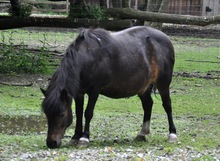Early diagnosis of Equine Metabolic Syndrome (EMS) is an important area of study especially considering one of the first signs can be laminitis, a serious and sometimes life-ending condition. Catching EMS in its initial stages can facilitate early intervention with an appropriate exercise and diet plan to reduce the chances of laminitis developing.

Shetland pony with symptoms of equine metabolic syndrome
With more research toward understanding the changes in microbiota and what influences these changes, it is possible this technology will be used in the future to help in management of syndromes such as EMS in equines.
© 2016 by DFoidl
In a first of its kind study, researchers at Gluck Equine Research Center at the University of Kentucky and the University of Guelph have been collaborating to find out if there are changes in the intestinal microbiota of horses afflicted with EMS. It is known that humans with metabolic disorders have these changes so the researchers set out to compare ten horses with EMS to ten horses in a control group by analyzing fecal microbiota with next generation sequencing of DNA.
Dr. Scott Weese, researcher at the Ontario Veterinary College says, âThe study revealed a decrease in the fecal microbial diversity for the EMS horses as well as differences in the overall community structure when compared to the metabolically normal control group of horses.â Both groups of horses were of comparable age and fed a similar all-forage diet for at least two months before sampling.
Links have been made between obesity and lower microbial diversity in human, dog and horse studies but there is still much to learn about optimal values for diversity. With more research toward understanding the changes in microbiota and what influences these changes, it is possible this technology will be used in the future to help in management of syndromes such as EMS.
For more information on the signs of metabolic syndromes including EMS, visit Equine Guelphâs Senior Horse Challenge healthcare tool.
"Every horse owner wants their horse to enjoy the best quality of life through all their years," says Dr. Robert Tremblay, Bovine/Equine Specialist at Boehringer Ingelheim Canada. âFor more ways to spot the early signs of diseases and illnesses use Equine Guelph's Senior Horse Challenge online tool. This interactive quiz will help horse owners to learn more about health challenges facing senior horses and gives ways to recognize signs of metabolic syndromes."
Equine Guelph is the horse ownersâ and care giversâ Centre at the University of Guelph. It is a unique partnership dedicated to the health and well-being of horses, supported and overseen by equine industry groups. Equine Guelph is the epicentre for academia, industry and government â for the good of the equine industry as a whole.
For further information, visit EquineGuelph.ca.
Story: Jackie Bellamy-Zions
